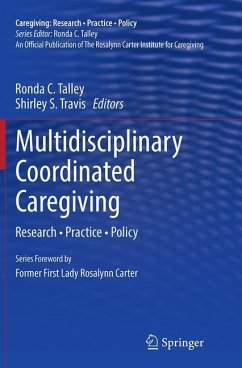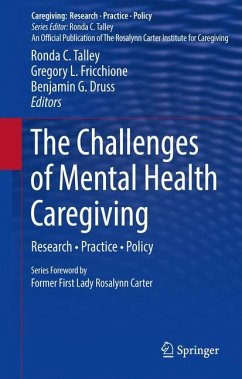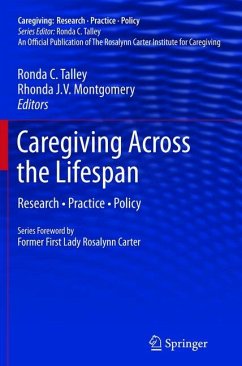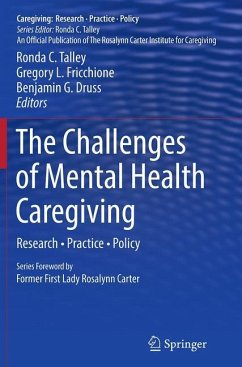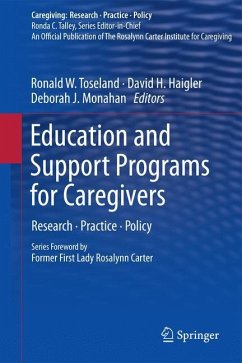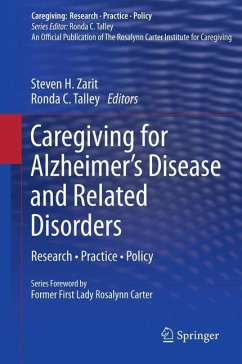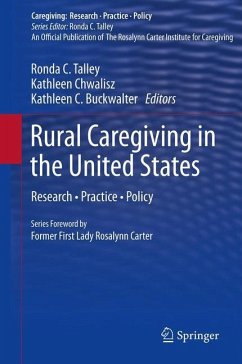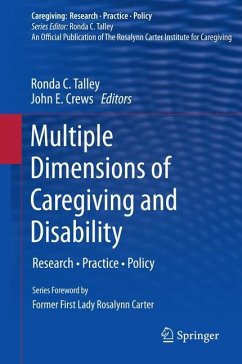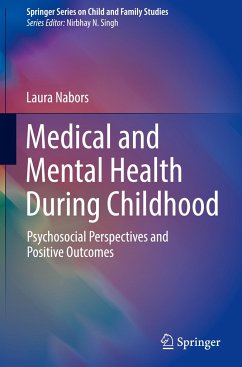
Multidisciplinary Coordinated Caregiving
Research ¿ Practice ¿ Policy
Herausgegeben: Talley, Ronda C.; Travis, Shirley S.

PAYBACK Punkte
38 °P sammeln!
Caregiving requires a coordinated effort by a variety of professionals, from psychologists to social workers to occupational therapists. Highlights the disciplines that contribute to direct care, Multidisciplinary Coordinated Caregiving is a resource for those who ultimately create collaborative approaches to contemporary caregiving issues. It presents a set of interesting and relevant professions in order to facilitate future dialogue about multidisciplinary and interdisciplinary perspectives on and interventions for the complex challenge of caregiving in America.
Coverage includes:
- The status of professional caregiving in the United States.
- Nursing perspective on the state of family caregiving.
- Psychological aspects of caregiving.
- A lifespan human development perspective on caregiving in late life.
- Public health contributions to caregiving
Multidisciplinary Coordinated Caregiving offers a wealth of insights and ideas for researchers, practitioners, and graduate students across the caregiving fields, including psychology, social work, public health, geriatrics and gerontology, and medicine as well as public and education policy makers.
Coverage includes:
- The status of professional caregiving in the United States.
- Nursing perspective on the state of family caregiving.
- Psychological aspects of caregiving.
- A lifespan human development perspective on caregiving in late life.
- Public health contributions to caregiving
Multidisciplinary Coordinated Caregiving offers a wealth of insights and ideas for researchers, practitioners, and graduate students across the caregiving fields, including psychology, social work, public health, geriatrics and gerontology, and medicine as well as public and education policy makers.
Effective, meaningful caregiving requires a well-coordinated and informed effort guided by various highly skilled specialists across several interrelated professions, including psychologists, social workers, and occupational therapists. Multidisciplinary Coordinated Caregiving addresses the information needs of these interrelated professionals, contributing to the direct care of individuals and serving as an essential resource for those who ultimately create collaborative approaches to contemporary caregiving plans. In addition, the volume provides a wealth of evidence-based research findings to facilitate ongoing dialogue about multidisciplinary and interdisciplinary perspectives on and interventions for the complex challenge of caregiving in America.
Key areas of coverage include:
The status of professional caregiving in the United States.Nursing perspectives on the state of family caregiving.Psychological aspects of caregiving.A human development, lifespan perspective on caregiving during late life.Public health contributions to caregiving.
Multidisciplinary Coordinated Caregiving offers a wealth of insights for those researchers, practitioners, and graduate students who seek to optimize the care of individuals across such fields as psychology, social work, public health, geriatrics and gerontology, and medicine as well as public and educational policy making.
Key areas of coverage include:
The status of professional caregiving in the United States.Nursing perspectives on the state of family caregiving.Psychological aspects of caregiving.A human development, lifespan perspective on caregiving during late life.Public health contributions to caregiving.
Multidisciplinary Coordinated Caregiving offers a wealth of insights for those researchers, practitioners, and graduate students who seek to optimize the care of individuals across such fields as psychology, social work, public health, geriatrics and gerontology, and medicine as well as public and educational policy making.





